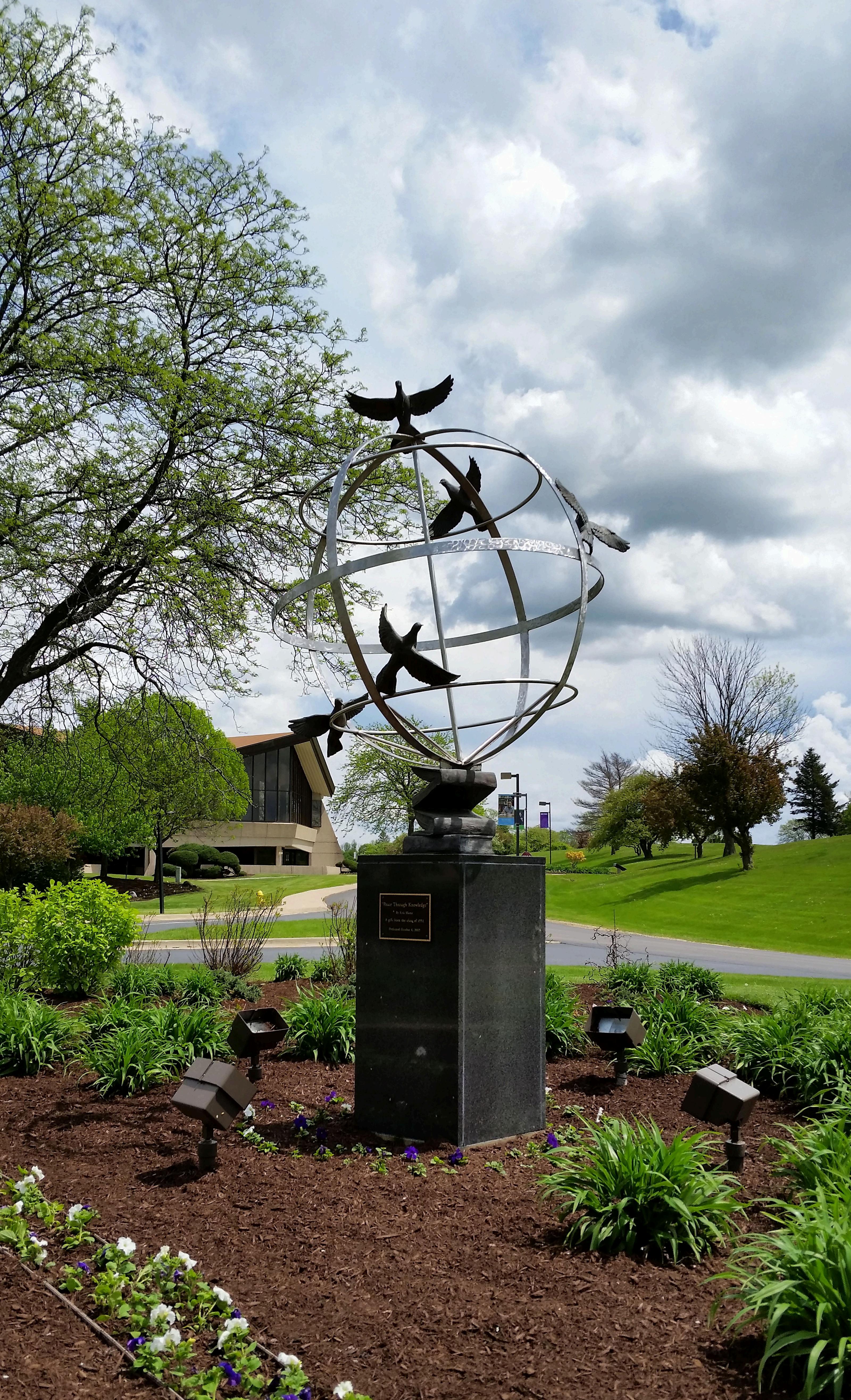
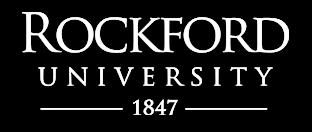



Welcome to the 2024-2025 edition of the Rockford University Fact Book. An institutional fact book provides a centralized location for valuable information about the University. Data within this document is available to facilitate the analysis of trends, decision-making, and reporting. The existence of the Rockford University Fact Book helps institutionalize the collection, dissemination, and use of standardized information.
The fact book is produced annually by the Office of Institutional Research. Every effort is made to include the most accurate, currently available data along with historical trends. All source information is located below tables and graphs throughout the fact book. A majority of the data in this edition reflects the 2024-2025 academic year. A PDF version of the fact book is available on the Rockford University website, www.rockford.edu.
If you have questions or suggestions, please contact Elizabeth Nardi, Chief Strategy and Research Officer, at (815) 394-4379 or enardi@rockford.edu.
This fact book could not have been produced without the collaboration of staff from across campus. Acknowledgements and thanks are in order for the following individuals:
Jennifer Cunningham Chief of Staff
Monique DiVenti
Maria Diemer
Jess Stanek
Associate Vice President of Human Resources
Executive Director of Global Affairs
Director of Athletics
Meera Kumar Director of Student Involvement & Orientation
Ed Tomaszkiewicz
Stephanie Nissen
Scott Mitchell
Jennifer Ocampo
Heidi Babcock
Sarah Spires
Joab Irwin
Director of Operations
Director of the Howard Colman Library
Assistant Dean and Director of Residence Life
Assistant Director of SAS
Assistant Director of SAS & Financial Aid Specialist
Assistant Registrar
Senior Public Safety Officer
Emily Ramboldt Alumni Data and Systems Specialist
Stephanie Prchal
Kayla Eddy
Communications & Data Specialist
Digital Content and Web Marketing Coordinator
Rockford University, formerly Rockford College, is a four-year, co-educational institution founded in 1847 offering undergraduate and graduate degrees in traditional liberal arts and professional fields. We offer approximately 80 majors, minors, and concentrations, including three online bachelor’s degree completion programs in Management Studies, Accounting Studies, and Human Services. Our Graduate Degrees include Master of Business Administration (MBA), Master of Arts in Teaching (MAT), and Master of Education (M.Ed.).
In 1847, during one of the great college-building eras in American history, Rockford Female Seminary was chartered by the Illinois legislature. The citizens of Rockford (population 2,500) pledged $3,500 to erect a building for the ambitious enterprise.
The first classes were held in the old downtown courthouse. Later the seminary moved to its own campus between the Rock River and Seminary Street. More than a century later, in the mid-1960s, the College moved to its present location at the eastern edge of the city.
The University has been an educational pioneer from the very beginning. In the 1840s, when Americans still doubted the value of educating women, the decision to make Rockford Female Seminary’s curriculum as demanding as that of a men’s college was a bold one. In 1882, Rockford Female Seminary granted its first bachelor’s degrees including that of Nobel Peace Prize recipient Jane Addams. In 1892, Rockford Female Seminary became Rockford College®. In 2013, Rockford College® became Rockford University.
The University was involved in the early development of adult education, offering these courses in 1919. In 1952, responding to a need in the community, the Center for Learning Strategies opened its doors to help young people and adults improve their academic skills. Men were first admitted during World War II when Rockford College® offered cooperative educational programs with the Illinois Institute of Technology. The institution became fully coeducational in 1958.
In recent years, Rockford University became home to one of only 11 Phi Beta Kappa (PBK) chapters in Illinois, the most prestigious honor society in the United States. Named by The Princeton Review as a Best Midwestern College, and as a Best Regional University by U.S. News and World Report, we currently serve approximately 1,140 full and part-time students.
Our mission is to educate people to lead responsible lives by means of a curriculum grounded in liberal arts learning and complemented and extended by professional and practical experience. Through the total academic and co-curricular experience, Rockford University strives to prepare students for fulfilling lives, careers, and participation in a modern and changing global society.
Rockford University graduates contribute to the world as knowledgeable, ethical, and productive citizens with the necessary resources to be active, effective, and reflective: knowledge for understanding the world, values for envisioning the world, and skills for shaping the world. These resources are developed through academic, social, civic, and personal educational experiences in the liberal arts and academic disciplines of the university. Knowledge and skills require values to be ethical; knowledge and values require skills to be effective; and values and skills without knowledge are at best empty, and at worst, destructive.
1. Knowledge for Understanding the World Knowledge is foundational for developing skills and values. A rigorous liberal arts education provides opportunities for acquiring both general and discipline-specific knowledge. Such knowledge enables graduates to understand the world as it exists, how it came to be, and to envision how it might be. Graduates acquire knowledge of individuals, the social world, and the natural world.
Knowledge of individuals. Understand the strengths, aspirations, aptitudes, and limitations of self and other individuals; the explicit and implicit aspects of identity; and the functioning of individuals in context. Develop self-knowledge to set and achieve life goals.
Knowledge of the social world. Understand the history, culture, structure, and function of U.S. and other world societies, and how societies affect individuals and groups through their institutions, principles, traditions, and values.
Knowledge of the natural world. Understand the structures and principles of the natural world recognizing its beauty, complexity, richness, and value.
2. Values for Envisioning the World Values are explored, debated, and formed at Rockford University. Graduates are educated to make ethically informed choices as individuals and citizens within a democratic society and the world community. Values for ethical decision-making are learned throughout the university experience, which emphasizes creative and experiential learning. Values for a better world include those relating to self, others, society, and nature.
Valuing individuals. Discern the consequences of personal behavior for oneself and others, practice civility, courage, curiosity, honesty, independence, integrity, objectivity, open-mindedness, and perseverance. Develop the aesthetic, intellectual, professional, and social realms of one’s life.
Valuing society. Value and exercise one’s civic rights and obligations in the community, nation, and world. Critically and creatively assess one’s own and others’ cultures and societies; strive to shape public policies and work for justice.
Valuing nature. Acknowledge humanity as a part of nature, understanding the value of scientific and aesthetic inquiry for the quality of the natural world.
The liberal arts at Rockford University embody a set of skills and habits of mind. These skills and habits include thoughtful analysis, precise communication, plus creative and effective application. Living in complex and diverse situations requires making connections among knowledge, values, and behavior.
Individual skills. Listen, read, speak, and write effectively and professionally; use basic mathematical concepts and operations; think creatively and logically, analytically, and synthetically; and evaluate appropriately. Applying these skills for decision-making may involve using technology.
Social skills. Creatively use information from multiple disciplines, perspectives, and technologies; work collaboratively; and communicate effectively in groups to understand, manage, and solve complex issues, situations, and problems.
Scientific skills. Devise, test, and verify hypotheses and evaluate results for their effects; gather data and evidence systematically using appropriate technology; and correctly apply scientific methods to problems in the natural and social worlds.
The Rockford University Strategic Plan was developed to propel the university into the next quarter century. This strategic plan outlines a five-year framework spanning fiscal years 2025 through 2029, aligning with the academic years 2024–2025 through 2028–2029. This timeline ensures a structured approach to achieving institutional goals, with initiatives and benchmarks set for each year within this period. The plan is structured around five thematic elements driven by the top university needs identified by the university community. Each year, Rockford University will conduct a comprehensive review of the strategic initiatives, measuring progress through key performance indicators (KPIs) that align with the institutional goals. This "Year in Review" will provide transparent insights into the university’s achievements, challenges, and areas for growth. Rockford University will also evaluate existing initiatives for effectiveness, considering necessary improvements and potential adjustments. By incorporating feedback from stakeholders and analyzing performance data, it will ensure that the strategies remain relevant and responsive to both internal and external changes, driving continuous improvement and institutional success. To view the strategic plan, please visit www.rockford.edu/portal/departments/presidentsoffice/strategic-planning/.
Academic year 2024-2025 is year one of the Strategic Plan.
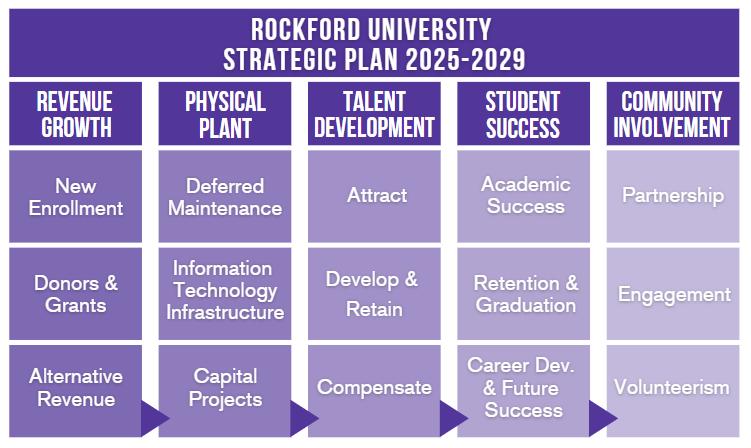
Rockford University has garnered numerous distinctions in recent years, making it an institution that stands out. Among the most notable:
Academic Excellence: One of 11 colleges and universities in Illinois and 290 in the country with a chapter of Phi Beta Kappa, the oldest and most prestigious liberal arts academic honor society.
Culturally Responsive Teaching and Leading: Rockford University was the first higher education institute in the state of Illinois to receive full program approval for the alignment of the Culturally Responsive Teaching and Leading standards (CRTL).
Exemplar Diverse Educator Recruitment and Retention: Rockford University was recognized as having submitted an exemplar Diverse Educator Recruitment and Retention Pilot that our faculty developed in partnership with community members in the Rockford area. Our faculty were invited to be on a panel for the Illinois State Board of Education in partnership with the American Institutes for Research (AIR) to provide evidence-based coaching and planning to support educator preparation programs (EPPs) in taking concrete steps to attract and retain teacher candidates of color.
Access through Economic Diversity: Ranked by the 2025 U.S. News and World Report as an Economically Diverse Regional University, underscoring our long-standing and successful effort to promote access for qualified students to excellent higher education, irrespective of the financial means of those students and their families.
Best in the Midwest: Regularly recognized as a best Midwestern university by national ranking websites, including:
o U.S. News & World Report: Named as a 2025 Best Regional University.
o The Princeton Review: Consistently ranked as one of the Best Midwestern Colleges based on student opinion data and The Princeton Review’s standards for academic excellence within each region.
o College Consensus: Named one of the 2020 Best Regional Universities based on results from the most reputable college ranking publishers and student reviews.
Advocate for Social Mobility: Named by the 2025 U.S. News & World Report as a Top Performers on Social Mobility. for successfully advancing social mobility by enrolling and graduating large proportions of disadvantaged students who receive Pell Grants.
Community Engagement: Rockford University joins just 361 other colleges and universities from across the nation, and is one of only 11 in Illinois, to receive the 2015 Community Engagement Classification from The Carnegie Foundation for the Advancement of Teaching. The classification is valid through 2025.
SOURCE: Department of Marketing and Communications
Rockford University Campus Acreage: 160 acres
Residence Halls
4940 E. State St. (Rental Building) 15,062 4960 E. State St. (Rental Building) 13,670
SOURCE: Senior Director of Operations; Residence Life
NOTES: Classrooms and
Programs of Study, Academic Year 2024-2025
Tracks/Concentration in italics
Accounting (B.A., B.S.)
Art, Studio (B.A.)
Art, Studio (B.F.A.)
2-Dimensional Art
3-Dimensional Art
Graphic Design
Art History (B.A.)
Biochemistry (B.S.)
Biology (B.A.)
Biology (B.S.)
Biomedical Sciences
Conservation and Wildlife
Business Administration (B.A., B.S.)
Chemistry (B.A.)
Chemistry (B.S.)
ACS Certification
Computer Science (B.A., B.S.)
Cybersecurity
Management Information Systems
Web Development
Criminal Justice (B.A., B.S.)
Data Analytics (B.A., B.S.)
Digital Marketing (B.A., B.S.)
Early Childhood Education (B.A., B.S.)
Early Childhood Education Studies (B.A., B.S.)
Economics (B.A., B.S.)
Elementary Education - Grades 1-6 (B.A., B.S.)
Elementary Education Studies (B.A., B.S.)
English (B.A.)
Financial Economics (B.A., B.S.)
Healthcare Administration (B.A., B.S.)
History (B.A., B.S.)
Secondary Education Licensure
Human Development (B.A., B.S.)
Child/Adolescent Development
Aging Studies
Lifespan
Humanities (B.A.)
International Studies (B.A., B.S.)
Kinesiology (B.A., B.S.)
Exercise Science
Sport Management
Teaching Licensure
Marketing (B.A., B.S.)
Mathematics (B.A., B.S.)
Computational
Data Science
General
Middle Grades Education (B.A., B.S.)
Nursing (B.S.N.)
Political Science (B.A., B.S.)
American Studies
Constitutional Studies
Legal Studies
Political Ideas
Politics and Cultures
War and Peace
Psychology (B.A., B.S.)
Science and Mathematics (B.A., B.S.)
Social Sciences (B.A.)
Sociology (B.A., B.S.)
Spanish (B.A.)
Special Education (B.A., B.S.)
Special Education Studies (B.A., B.S.)
Supply Chain Management (B.A., B.S.)
Theatre Arts (B.A.. B.S)
Theatre (B.F.A.)
Acting/Directing
Design & Production
Musical Theatre Performance
Theatre Management
Accounting Studies (B.S.)
Management Studies (B.S.)
Human Services (B.S.)
Accounting
Aging Studies
Ancient and Medieval Studies
Art, Studio
Art History
Bilingual Education
Biology
Business Administration
Chemistry
Child & Adolescent Development
Coaching
Criminal Justice
Cybersecurity
Dance
Economics
English
English as a Second Language
Education
Entrepreneurship
Exercise Science
Forensics
Gender Studies
Graphic Design
Health
History
International Studies
RU ONLINE CERTIFICATES
Accounting
Bookkeeping
Finance
Human Resources
Leadership
Marketing
Operations Management
PK-12 Education
Physical Education, World Languages
Latin American, Caribbean, & Iberian Studies
Lifespan Development
Linguistics and Translation
Management Information Systems
Marketing
Mathematics
Music
Peace and Conflict Studies
Philosophy
Physical Education
Physics
Political Science
Psychology
Religious Studies
Secondary Education (9-12)
Biology, Chemistry, English/Language Arts, History, Mathematics
Sociology
Spanish
Special Education
Sport Management
Theatre Arts
Theatre Design & Production
Web Development
PRE-PROFESSIONAL PROGRAMS
Pre-Engineering
Pre-Law
Pre-Dentistry
Pre-Medincine
Pre-Pharmacy
Pre-Physician Assistant
Pre-Veterinary Medince
Master of Education (M.Ed.)
Master of Arts in Teaching (MAT)
Pedagogical Practice Programs Leading to Professional Educator License (PEL)
Reading Specialist
Early Childhood (Birth to grade 2)
Urban Education Early Childhood Special Education Approval (PreK Only)
Urban Education Leadership Elementary (grades 1-6)
M.Ed. Programs with thesis option (one endorsement):
Middle Grades (grades 5-8)
o Literacy
M.Ed.: Bilingual Education o Mathematics
M.Ed.: Early Childhood (Birth to Grade 2) Education o Social Science
M.Ed.: Elementary (1-6) Education o Science
M.Ed.: English as a Second Language (ESL) Education PK-12
M.Ed.: Physical Education o World Language: Spanish
M.Ed.: Reading Teacher o Physical Education
M.Ed.: Special Education (LBSI) Secondary o Biology
M.Ed. Programs with no thesis option (Two endorsements): o Chemistry
M.Ed.: Early Childhood with Bilingual Endorsement o English/Language Arts
M.Ed.: Early Childhood with ESL Endorsement o History
M.Ed.: Early Childhood with LBSI Endorsement o Mathematics
M.Ed.: Early Childhood with Reading Specialist Endorsement Special Education-LBS1 (K-22)
M.Ed.: Early Childhood with Reading Teacher Endorsement
M.Ed.: Reading Specialist w/ LBSI Endorsement Subsequent Endorsement Programs for
M.Ed.: Reading Teacher w/ LBSI Endorsement Licensed Educators:
M.Ed.: Reading Teacher w/ ESL Endorsement Bilingual
M.Ed.: Special Education w/ Bilingual/ESL Endorsement Bilingual and English as a Second Language
M.Ed.: Special Education w/ ESL Endorsement Early Childhood (Birth to Grade 2)
Elementary (Grades 1-6)
English as a Second Language Master of Business Administration (M.B.A.)
Learning Behavior Specialist 1 Concentrations in:
Finance
Healthcare Administration
Reading Teacher
Programs Not Leading to Initial Licensure or Endorsement:
Organizational Leadership Education
Project Management
Graduate Certificates in:
Finance
Healthcare Administration
Organizational Leadership
Project Management
Instructional Strategies
Rockford University is a private, independent, coeducational university providing courses of study leading to baccalaureate and master’s degrees. Academic programs are based on a foundation of learning in the liberal arts. The university emphasizes excellence in teaching and has a strong commitment to scholarly activity, creative expression, and community service. The educational program is characterized by a concern for the needs of all students and reflects the basic human rights and responsibilities of a democratic society.
Rockford University is accredited by the Higher Learning Commission (HLC) which is the regional accrediting body for the North Central Association of Colleges and Schools. Rockford University has been accredited since 1913. For more information on HLC, visit hlcommission.org
In addition to the campus accreditation, the following Rockford University programs are accredited by the relevant disciplinary accrediting bodies:
Accrediting Agency
Accreditation Commission for Education in Nursing, Inc. (www.acenursing.org)
American Chemical Society (www.acs.org)
International Assembly for Collegiate Business Education (www.iacbe.org)
Accredited Program(s)
BS in Nursing (BSN)
BS in Chemistry
BA in Chemistry
BS in Chemistry, ACS Certified
BA in Accounting
BS in Accounting
BA in Economics
BS in Economics
MBA in Business Administration
In addition to the campus accreditation, the following Rockford University programs are approved by the relevant disciplinary accrediting bodies:
Illinois State Board of Education (ISBE) Approved Programs, which lead to license:
Early Childhood (Birth-2)
Elementary (1-6)
Middle Grades Language Arts (5-8)
Middle Grades Math (5-8)
Middle Grades Science (5-8)
Middle Grades Social Science (5-8)
Early Childhood Special Education (Birth-2)
Special Education, Learning Behavior Specialist 1 (K-22)
World Language, Spanish (PK-12)
We offer endorsement-only plans in:
ESL Education
Bilingual Education
Physical Education (K-12)
Secondary Biology (9-12)
Secondary Chemistry (9-12)
Secondary English Language Arts (9-12)
Secondary History (9-12)
Secondary Math (9-12)
Reading Teacher
Reading Specialist
PK-22 Principal Endorsement
Visual Arts (PK-12)
Theatre Arts (PK-12)
PHI BETA KAPPA
The Phi Beta Kappa Society was founded in 1776 at the College of William and Mary (Williamsburg, Virginia). Phi Beta Kappa (PBK) is the nation’s oldest and most prestigious undergraduate national academic honor society. Today, there are 293 chapters of Phi Beta Kappa in the nation – Rockford University is one of just 11 colleges and universities in Illinois with the distinction of having a chapter of Phi Beta Kappa. The Phi Beta Kappa Chapter at Rockford University (Eta of Illinois) was established in 1953, during the tenure of President Mary Ashby Cheek. Each year since that time, the chapter inducts a select few of its graduating seniors into the Society. These are young men and women who have excelled academically, not only in their chosen major, but also in a broad course of study emphasizing the liberal arts. They have studied a foreign language, they have demonstrated a knowledge of mathematics and science suitable to a liberal arts education, and, through their study, they have gained an appreciation of literature and the fine arts.
Phi Alpha Theta is an international honor society in history. It was organized at the University of Arkansas in 1921, and now includes more than 750 local chapters. Rockford University’s local chapter, Alpha Delta Alpha, was started in 1987 and includes dozens of members. The membership of Phi Alpha Theta is composed of students and faculty who have been elected on the basis of excellence in the study and writing of history. Any student of history–not just those majoring in history–may become a member simply by maintaining a high standard of work in his/her studies. In addition, all members participate in the work and direction of the Society.
Sigma Xi (Scientific Research)
Sigma Xi was founded in 1886 at Cornell University 4CKeyby a group of engineering students and a junior faculty member, Frank Van Vleck. From the beginning, the founders emphasized that the new scientific honor society would be broad in its outlook, devoted to all of science and engineering. Cornell geology professor Henry Shaler Williams soon became the fledgling society's chief mentor, serving as the first elected president and a leader of the growing organization until the turn of the century.
Alpha Sigma Lambda (National Academic Honor Society)
As the premier nationally recognized honor society for adult learners with more than 75 years of established history in higher education, Alpha Sigma Lambda represents the top non-traditional students for more than 300 institutions across the United States. Alpha Sigma Lambda Honor Society is recognized as the official honor society for adult learners by the Association of College Honor Societies.
Chi Alpha Sigma (National Athletic Honor Society)
Chi Alpha Sigma is the first, and only, nonprofit organization that was established to recognize four-year college student-athletes who excel both on and off the field of competition. Founded in 1996 by then DePauw University head football coach, Nick Mourouzis, Chi Alpha Sigma continues to provide outstanding student-athletes with an opportunity to become connected within a fraternal association that aligns their educational and athletic successes for a lifetime.
Eta Sigma Phi (Latin and/or Greek)
Eta Sigma Phi is the national honorary collegiate society for students of Latin and/or Greek. Members are elected by local chapters which have been chartered by the society.
Tri-Alpha, also known as Alpha Alpha Alpha, is a national honor society specifically designed to recognize and support first-generation college students. Tri-Alpha’s mission is to celebrate the academic achievements of first-generation college students, promote leadership development, and provide a network of support for these students.
School of Business Departmental Honors Program
The honors program supplements the traditional curriculum in economics, business and accounting by providing a unique opportunity for intellectual enrichment and pursuit of academic excellence. The honors courses are designed to explore general topics of interest at an intellectually challenging level using an interdisciplinary and integrative approach to learning.
Study Suites 5 suites (1 suite with a SMART Board & 4 suites with A/V)
Dedicated Individual Study Carrels 77
SOURCE: Director of the Howard Colman Library
This section will consist of campus enrollment across different programs as well as campus demographic information. The data is presented in a variety of charts. Student Enrollment - Fall 2024
SOURCE: IPEDS 2024-25 Fall Enrollment Survey

SOURCE: Student Administrative Service
Note: Included in this count are non-degree seeking students
Average Total Full-Time Equivalent All Programs
Average Traditional UG Full-Time Equivalent
Average Graduate Full-Time Equivalent
Average Degree Completion UG Full-Time Equivalent
SOURCE: Student Administrative Services
Note: Included in this count are non-degree seeking students. Calculation uses average between fall and spring headcounts at census.
Note: This information is as of Census for the Fall Term. BSXX programs are included in the grand total undergraduate’s table.
Student Demographics - Fall 2024
New Student Admissions Funnel - Fall 2024 First-Time Degree-Seeking Undergraduate Students Undergraduate Transfer Students Graduate Students
SOURCE: Office of Admission - Weekly Funnel Reports at Census
Top five states represented for first-time freshman include: Illinois Florida Wisconsin Texas Indiana

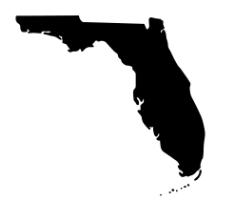

SOURCE: IPEDS 2024-25 Fall Enrollment Survey

Status
SOURCE: Office of Admission
NOTE: *Tracking of conditional admits changed for Fall 2019 to eliminate the distinction between regular admission and conditional status.
SOURCE: Office of Admission Some percentages may add to more than 100% due to rounding.
2024-2025 Tuition, Residence Hall Room and Board Fees Tuition
Full-time Undergraduate Tuition
Part-time Undergraduate Tuition (Fall/Spring)
Part-time Undergraduate Tuition (Summer)
Average Graduate Tuition (Full-time Graduate Students)
$37,230.00/year
$890.00/credit hour
$680.00/credit hour
$13,860.00/year
Graduate Per Credit Hour Charge (Part-Time Graduate Students) $770.00 Room
Double Room
Single Room (subject to availability)
Super Single Room (subject to availability)
Double Single Room (subject to availability)
$6,170.00/year
$6,170.00/year
$6,170.00/year
$6,170.00/year
Suite $6,170.00/year Board
19 Meal Plan/Traditional $50 Flex $5,250.00 15 Meal Plan/Traditional $75 Flex $5,060.00 10 meal Plan/$325 Flex $4,970.00
Tuition Deposit (Non-refundable, when a student accepts admission) $100 Non-Refundable Registration Fee $100.00/semester
Graduate Application Fee $0
Required Fees (Full-Time Graduate Students) $200.00
SOURCE: Student Administrative Services (SAS) & IPEDS Institutional Characteristics 2022-23
Below are the total dollar amounts awarded to the full-time and less than full-time degree-seeking undergraduates enrolled. These totals also include aid awarded to international students. Aid that was nonneed-based but used to meet need is reported in the need-based aid columns.
Need-based $ Non-need-based $
(Include non-needbased aid used to meet need.) (Exclude non-needbased aid used to meet need.)
Scholarships/Grants
State (i.e., all states, not only the state in which your institution is located)
Institutional: Endowed scholarships, annual gifts and tuition funded grants, awarded by the college, excluding athletic aid and tuition waivers (which are reported below)
Scholarships/grants from external sources (e.g., Kiwanis, National Merit) not awarded by the college
Self-Help
Student loans from all sources (excluding parent loans) $4,047,730 $922,109
Federal Work-Study $92,796
State and other (e.g., institutional) workstudy/employment (Note: Excludes Federal Work-Study captured above.) $110,359 $518,595
Source: Common Data Set (Section H1); Student Administrative Services (SAS)
Through Student Activities, students can meet new people on campus, test and further develop their leadership skills, and have fun. These opportunities offer a plethora of experiences for all students. In fact, our campus community is large enough to provide a diverse list of activities and clubs, but it’s also small enough for students to get involved in as many organizations as they’d like. And if they don’t see a club or organization they desire, they can start one!
By participating in the Campus Activities Board (CAB), Rockford University students plan events for the entire campus to enjoy. CAB is a student group that brings musicians, comedians, and other performers to campus. CAB also programs Homecoming, the End of the Year Bash, and other dances.
Students also play an important role in college governance through the Student Government Association (SGA). Student representatives may hold memberships on the Board of Trustees and Student Life Committee, as well as being members of the standing committees of SGA. During the academic year of 2024-2025, Rockford University had 18 registered student clubs and organizations:
Alpha Helix
Leading Educators Club
Arabs United Multicultural Club Art Club Nursing Student Organization
Black Student Union (BSU) Saudi Club
Book Smart Sexuality and Gender Alliance (SAGA)
Campus Activities Board (CAB) Sign Language Club
Commuter Council
Student Athlete Advisory Committee (SAAC)
Fellowship of Christian Athletes (FCA) Student Government Association (SGA)
First Gen. Forward Toastmasters Club
The residence halls provide students with opportunities to live and grow outside of the classroom through interactions with peers. Living on campus allows individuals to assume responsibility for their own growth, as well as community development through taking responsibility of Rockford University community standards. Residence Life focuses educational endeavors on the development of the whole student. Each residence hall floor and building community, under the guidance of Hall Directors and Resident Assistants, work to provide activities covering holistic student needs in the following categories: social, environmental, physical, cultural, occupational, emotional, intellectual, and financial.
This creates a dynamic living space to develop while at Rockford University. Between studying, getting involved in student organizations, participating in community service and volunteering, most Rockford students are active and engaged in their community. Residential living adds to your university experience by providing you with an opportunity to do all these things while living in an active, vibrant community with your peers.
SOURCE: Director of Residence Life, Student Administrative Services
NOTE: Percentages represent the percentage of all full-time undergraduate students in each category.
The small houses consist of 6 residence halls, all of which are self-contained and co-ed by floor. Each small house has a common area lounge.
1. Dayton
2. Svenson
3. Caster
4. Olson
5. Ekvall
6. McPhail
This three-story complex encompasses four buildings suitable for undergraduate students. The four halls are connected but maintain their individual community environment.
1. Emerson
2. Barnes
3. Talcott
4. Lathrop
The Rockford University Department of Public Safety is dedicated to enhancing the quality of life by providing a safe and secure environment conducive to learning and consistent with this institution’s diverse educational goals. We are committed to a professional, proactive, community-orientated approach to campus safety by recognizing that our staff, faculty, students, and the community we serve are our most important assets.
The Rockford University Department of Public Safety employs three full-time and one part-time armed public safety officers through its contract with the State Protection Service. The Department of Public Safety is staffed and operational 24 hours a day, seven days a week, 365 days a year. The department has a long-standing relationship with the Rockford Police Department, the Rockford Fire Department, and the Winnebago County Sheriff’s Office, including the city’s emergency medical and ambulance services.
The Rockford University Department of Public Safety is committed to providing all campus community members with the highest quality of service. We strive to do so by taking a forward-thinking approach to safety and security. As part of the continued efforts to improve services, all students, faculty, and staff have access to the Rockford University Public Safety app on their smartphones, tablets, and computers, which allows access to the following:
• Campus safety tips
• Emergency response information
• Vehicle registration forms
• Personal property registration forms
• Parking policy
• Campus maps
• Current weather conditions
• Training schedules and sign-up for training
• And more…
The following crime statistics are in accordance with the Jeanne Clery Disclosure of Campus Security Policy and Campus Crime Statistics Act (formerly the Campus Security Act).
SOURCE: 2025 Annual Security and Fire Safety Report, Department of Public Safety
*Statistical data reported in the category of "On-Campus Housing Facility" must also be reported under the "On-Campus Property" classification.
**The Clery Act no longer uses Sex Offense Forcible or Nonforcible as categories. They have been changed to more specific descriptions: Rape, Fondling, Incest, and Statutory Rape.
Rockford University offers 12 intercollegiate varsity teams, along with several junior varsity teams, and competes in the NCAA Division III, Northern Athletics Conference. For more information about Regent Athletics, visit goregents.com.
SOURCE: Associate Director of Athletics/Compliance and Eligibility; Athletic Department Rosters
The Office of Global Affairs fosters an internationalized campus culture by offering opportunities for students, faculty, staff, and the Rockford community to engage globally through intercultural events, study and service abroad programs, international partnerships, and support for both incoming and outgoing students. Signature events such as Eid dinners, the International Food and Arts Festival, and Study Abroad Fairs attract 50–500 attendees and promote dialogue on global topics, cultural exchange, and community building through Rockford University's Council on Global Affairs.
Study Abroad
Rockford University offers students a variety of global learning opportunities designed to broaden perspectives and enhance academic and cultural understanding. Through semester-long partnerships and faculty-led programs, students engage with diverse cultures across Asia, Europe, and the Americas. Over the past five years, many students have studied abroad, participating in experiences that range from semester exchanges at partner universities to immersive, faculty-led trips focused on academic inquiry and global citizenship.
Nanjing Sports Institute
Regents
Uni. of Santiago de Compostela
SOURCE: Executive Director of Global Affairs
SOURCE: Executive Director of Global Affairs
SOURCE: Executive Director of Global Affairs
Rockford University’s English Language Institute (ELI) helps non-native English speakers achieve academic and professional proficiency by developing key language skills—listening, speaking, reading, writing, and grammar—while also enhancing pronunciation, presentation, soft skills, and intercultural communication. The program serves F-1 visa holders, other eligible visa types, and local residents or U.S. citizens. Graduates of the ELI may continue into degree programs at Rockford University or pursue vocational and academic goals. With a diverse mix of international and local students, the ELI offers a rich, multicultural learning environment.
Totals: 11
SOURCE: Executive Director of Global Affairs
A Hispanic-serving institution is defined in U.S. federal law as an accredited, degree-granting, public or private nonprofit institution of higher education with 25% or higher total undergraduate Hispanic or Latino full-time equivalent student enrollment. Rockford University is currently an Associate Member Institution (AMI) which is defined as a nonprofit, accredited college, university, or system/district in the U.S. or Puerto Rico, where at least 1,000 Hispanic students are enrolled, or total Hispanic enrollment constitutes at least 10% of the total enrollment at the undergraduate or graduate level or both. Rockford University is working closely with the Rockford community to better serve this population of students and is working towards being categorized as a Hispanic-Serving Institution (HSI) by the Hispanic Association of Colleges and Universities.
Hispanic Serving Institution (HSI) Summary Report by Academic Year
Hispanic Serving Institution (HSI) Summary
Notes: All number above include Non-Degree, Part-Time, and BSXX programs
**Includes all students (Fall, Spring, Summer)
Unknown / Prefer not to Say
*Added to ease concerns of non-responders.
SOURCE: Multi-Year IPEDS Completions Surveys
NOTE: Percentages may not add to 100% due to rounding.
SOURCE: Multi-Year IPEDS Completions Surveys
NOTE:
may not add to 100% due to rounding.
SOURCE: Multi-Year IPEDS Completions Surveys by the Office of Institutional Research
NOTE: Summing up, the number of degrees conferred for each major does not equal the total number of graduates because some students graduate with double majors. Similarly, the sum of percentages will be greater than 100%.
SOURCE: Multi-Year IPEDS Completions Surveys by the Office of Institutional Research
NOTE: Percentages may not add to 100% due to rounding.
This section provides key indicators of student persistence and success at Rockford University. Retention rates measure the percentage of first-time, full-time students who return to the University for their second year, reflecting student satisfaction and academic engagement. Graduation rates represent the percentage of students who complete their degree within a specified time frame, typically six years for bachelor’s programs. Together, these metrics help assess the effectiveness of student support initiatives, academic programs, and institutional commitment to student achievement.
Retention Rates % Cumulative Graduation Rates %
Cohort Number Enrolled 2nd Year Retention (Published Retention Rate)
in 4 Years (IPEDS Rate)
in 5 Years
in 6 Years (IPEDS Rate)
Fall 2022 169 69%
Fall 2023 190 65%
Fall 2024 214 66%
Published Rate for 2024-2025 is 65%
IPEDS 4-Year Average Student Right-to-Know
Transfer-out Rate Calculation Completion or Graduation Rate Calculation
(Total Transfer-out Student / Adjusted Cohort) (Total Completers with 150% / Adjusted Cohort) 11% 39%
In addition, when assessing students who don’t return, they are listed within three different withdrawal types. Dismissal is when a student is asked to leave the college due to a specific reason that could be academic or nonacademic in nature. Withdrawal is when a student decides to leave the university for their own reasons. A leave of absence is given for certain situations giving a student a one-year break before they return. Below is a table showing the last 5 years of withdrawn types.
SOURCE: IPEDS Graduation Rates 200 2023-2024, IPEDS Graduation Rates 2023-2024, & Student Administrative Services (SAS) Cohort Reports
Rockford University achieved strong post-graduation outcomes during the 2023–2024 academic year. Using a multi-source methodology that combined survey results, LinkedIn data, internal student records, and faculty/staff outreach, the overall job placement rate was 86.9% for undergraduate students and 91.1% for graduate students one year post graduation. An additional 10% of graduates continued their education. This comprehensive approach, now adopted by Career Services for annual use, ensures consistent and accurate tracking of graduate success. Future plans include expanding LinkedIn engagement, enhancing collaboration between Career Services and Alumni Relations, and integrating annual placement data directly into the University Fact Book to support transparency and strategic planning.
Job Placement Rate by Year and Degree Level
Undergraduate Level
Rockford University alumni are cutting-edge scientists, nurses at major hospitals, and Golden Apple awardwinning educators. They are graphic designers, sports managers, and computer scientists. Our alumni are performers, artists, and so much more! Each alum is an important part of Rockford University’s bold history, and they continue to do amazing things across the globe.
Rockford University’s Alumni Association is led by a board whose mission is ‘to connect and engage current and future alumni for the advancement of Rockford University.’ Each year the Alumni Association Board gives several awards to alumni and long-time university supporters. They also work with the Office of Advancement & Alumni to put on events each year such as Homecoming and Reunion weekend, the Gala, plus many other professional development gatherings and webinars.
United States Grand Total: 17,178

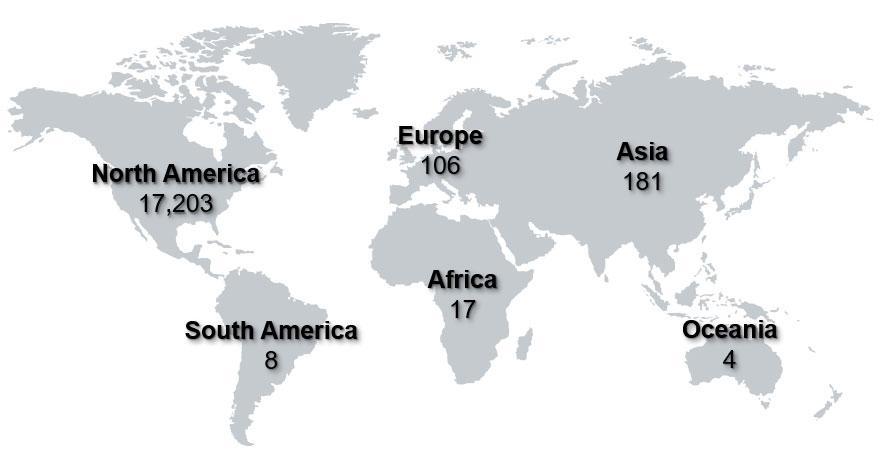
SOURCE:
SOURCE: 2023-24 IPEDS Human Resources Survey; Assistant Vice President of Human Resources NOTE: Percentages may not add to 100% due to rounding.
SOURCE: 2023-24 IPEDS Human Resources Survey; Assistant Vice President of Human Resources NOTE: *Percentages may not add to 100% due to rounding. Fall 2020 and Fall 2021 Data was not collected.
SOURCE: 2023-24 IPEDS Human Resources Survey; Assistant Vice President of Human Resources
NOTE: *Percentages may not add to 100% due to rounding. Fall 2020 and Fall 2021 Data was not collected.
SOURCE: Assistant Vice President of Human Resources: Human Resources
Dean of College of Arts and Humanities: Dr. Jennifer Langworthy Department Faculty Department Faculty
Art
English
Christopher Sisson (Chair)
Dr. Jennifer Langworthy
David Menard
Philip Soosloff
Dr. Kyle Steadman (Chair)
Dr. Michael Perry
Dr. William Gahan
Jennifer Jenkins
Dr. Kristin Ravel
Dr. Jennifer Rea
Dr. Mary Weaks-Baxter
Dr. Catherine Forslund (Chair)
Performing Arts
Languages, Literatures, and Cultures
Library
Beth Drog (Chair)
Deborah Mogford
Timm Adams
Eric Brockmeier
Marissa Barnahan
Emma Cullimore
Dr. Yoandy Cabrera Ortega (Chair)
Dr. Genevive Dibley
Dr. Matthew Flamm
Dr. Xabier Fole Valera
Andy Newgren History, Politics, and International Studies
Dr. Alexis Baldacci
Stephanie Nissen
Dean of College of Science, Mathematics, and Nursing: Dr. Filiz Dik Department Faculty Department Faculty
Dr. Mehmet Dik (Chair)
Dr. Filiz Dik
Mathematics, Computer Science, and Physics
Nursing
Dr. Ahmed El Ouadrhiri
Dr. Susan Sorensen
Dr. Donna Ogle
Dr. Viktoriia Dobriak
Dr. Julie Luetschwager (Interim Chair)
Dr. Kimberly McCullough
Dr. Karen Black-Vetter
Caryn Ruzic
Elle Myers
Kimberley Hartwig Devine
Chemical and Biological Sciences
Psychology
Dr. Deborah Breiter (Chair)
Dr. Matthew Bork
Dr. Emily Webb
Dr. James Marshall
Dr. Kari Severson
Mikayla Hwang
Dr. Melissa Korkmaz-Vaisys
Dr. Joel Lynch (Chair)
Dr. Amy Martin
Dr. Lisa Mehlig
Dean of College of Social Sciences, Commerce, and Education: Jacob Hardesty Department Faculty Department Faculty
Dr. Danille Klein (Co-Chair)
Dr. Kimberlee Wagner (Co-Chair)
Dr. Annie Baddoo
Dr. Jacob Hardesty
Education
Political Science, Sociology, and Criminal Justice
Dr. Kelly Monson
Lisa Chupich
Dr. Terri Easter
Mallori Sage
Dr. Pavalli Reddy
Dr. Ron Lee (Chair)
Dr. Bethany Twitty
Dr. Timothy Johnson
Puri School of Business
Dr. Luis Romero (Chair)
Christina Anderson
Christine Albert
Dr. Kathryn Cook
Dr. Stephen Troveh
Dr. Micheal Youngblood
Robert Evans
Ann Boe (Chair)
Tammy Schiek
Physical Education
Dr. Catherine Headley
Dr. Jason Hunter
COLLEGE OF PROFESSIONAL AND EXTENDED LEARNING
Department
Faculty
Professional and Extended Learning Dr. Deepshikha Shukla - Associate VP of Business Innovations
Source: Academic Affairs; Note: This data excludes adjunct faculty and graduate assistance.
Dr. Patricia A. Lynott, President
Dr. Randy Worden, Chief Operations Officer
Mrs. Jen Cunningham, Chief of Staff
Mrs. Elizabeth Nardi, Chief Strategy & Research Officer
Dr. Elizabeth Davies, Vice President for Academic Affairs and Provost
Mr. John DiRaimondo, Vice President for Finance and Chief Financial Officer
Mrs. Katherine Trotter, Vice President for Advancement
Ms. Megan Frankfother, Vice President for Enrollment Management
Dr. Deepshikha Shukla, Associate VP of Business Innovations, and Professor of Physics
Officers:
Marci K. Taets
Greg Allen
Jeffry Potter
Aaron Potter
Members:
Keith Akre
Teresa Beach-Shelow
Charles Box
Chad Brigham
Lesly Couper
Elizabeth Donovan
Rebecca Epperson
Anisha Grimmett
Elizabeth Hegel
Michael Iasparro
James Keeling
Joel Moore
Anthony Scandroli
Elaine Sharpe
Kristin Smith
Patricia Tumilowicz
Frank E. Walter
Patricia A. Lynott, President
Mary Ann Laudicina, Alumni Trustee
Tammy Schiek, Faculty Trustee
Ashley Harkey, Student Trustee
Emeriti Trustees:
Charles L. Colman
Dawn R. Hallsten
L. Thomas Heiser
Helen C. Hill
Charles J. Howard
Teresa J. Ingrassia
Dennis W. Johnson
Kent A. Mallquist
Thomas Muldowney
Sunil Puri
David Rydell
Louise C. Sinclaire
Angelo L. Spoto
Barbara Tanaglia
James S. Whitehead
Jonathan S. Whitlock
R. Ray Wood
President Emeriti:
Robert L. Head, Ph.D.
William A. Shields, Ph.D.
The following is a list of our past and present Rockford University presidents. Included in this count are the first four principals of Rockford Female Seminary.
Anna Peck Still – Founder and 1st Principal of Rockford Female Seminary, 1852-1884
Martha Hillard – 2nd Principal of Rockford Female Seminary, 1884-1888
Anna Gelston – 3rd Principal of Rockford Female Seminary, 1888-1890
Sarah F. Anderson – 4th Principal of Rockford Female Seminary and President of Rockford College, 1890-1896
Phebe T. Sutliff – 5th President of Rockford College, 1896-1901
Emily K. Reynolds – 6th President of Rockford College, 1901-1902
Julia Gulliver – 7th President of Rockford College, 1902-1919
Dr. William A. Maddox – 8th President of Rockford College,1919-1933
Dr. John Gordon – Acting President of Rockford College, 1933-1934
Dr. Gordon K. Chalmers – 9th President of Rockford College, 1934-1937
Dr. Mary Ashby Cheek – 10th President of Rockford College, 1937-1954
Dr. Leland H. Carlson – 11th President of Rockford College, 1954-1959
Dr. John A Howard – 12th President of Rockford College, 1960-1977
John D. Spence – Acting President of Rockford College, 1977-1979
Dr. Norman Stewart – 13th President of Rockford College, 1979-1988
Dr. Gretchen Von Lowe Kreuter – 14th President of Rockford College, 1988-1992
Dr. William A Shields – 15th President of Rockford College, 1992-2002
Dr. Paul Pribbenow – 16th President of Rockford College, 2002-2006
Dr. Richard Kneedler – Interim President of Rockford College, 2006-2008
Dr. Robert Head – 17th President of Rockford University, 2008-2016
Dr. Eric W. Fulcomer – 18th President of Rockford University, 2016-2022
Dr. Patricia Lynott – 19th President of Rockford University, 2022- present
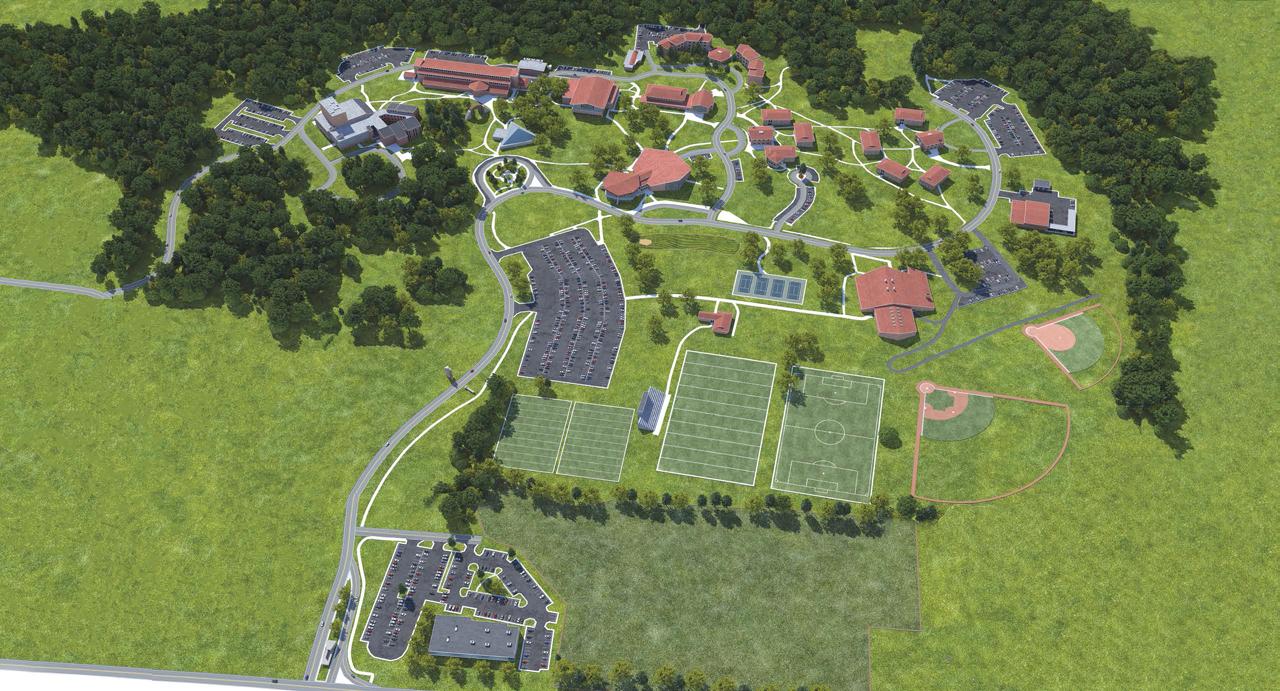
1 Main Entrance/Gloyd Parkway
2 Blanche Walker Burpee Student Center
LOWER LEVEL
Athletics
Main Floor
Bookstore
Career Services
Chief of Police
Computer Stations
Dean of Students
eSports Arena
Jane Addams Center for Civic Engagement
Residence Life
Student Activities
Student Clubs and Organizations
Student Government
Student Life
The Den
SECOND FLOOR
Cafeteria
Dining Services
English as a Second Language (ESL)
Faculty Dining Room
Mail Room
Office of Global Affairs
President’s Dining Room
Print Services
Regents Hall
THIRD FLOOR
Offices of the President, Special Assistant, Chief of Staff and Marketing/Communications
Forrest Cool Lounge
3 Fisher Memorial Chapel
Chapel
4 Clark Arts Center
Art Gallery
Art Studios
Box Office
Cheek Theatre
Dance Studio
Faculty Offices
Graphic Design Lab
Maddox Theatre
5 Starr Science Center
Center for Learning Strategies
Computer Labs
Faculty Offices
Language Lab
Nursing Learning Laboratory
Peterson Auditorium
Science Labs
Small Science Auditorium
6 Refrigeration Plant
7 Howard Colman Library
Academic Affairs
Archives
Computer Stations
Faculty Offices
Information Technology Center
Provost
Rare Book Room
Registrar
Student Success and Retention
Writing Center
8 Scarborough Hall
Computer Lab
Faculty Lounge
Faculty Offices
Golden Apple Foundation
Severson Auditorium
9 Lang Center for Health and Wellness
Counseling Center
Disability Support Services
Faculty Offices
10 Cummings Complex
Emerson Residence Hall
Barnes Residence Hall
Talcott Residence Hall
Lathrop Residence Hall
11 Olson Residence Hall
12 Johnson Center
Office of Admission
13 Nelson Hall
MAIN FLOOR
Student Administrative Services (SAS)
Facilities Services
Police and Department of Public Safety
21 Seaver Physical Education Center
Athletic Hall of Fame
Athletic Training Room
Faculty Offices
Fitness Center
Free Weight Room
Gymnasium
Multipurpose Gym
Addams International Peace
School of Business LOWER LEVEL (EAST-SIDE ENTRANCE)
Business Office
Faculty Offices
Human Resources
Student Employment
Student Lounge
FLOOR (NORTH-SIDE ENTRANCE)
Classrooms
Computer Labs
30 Start of 18-hole Disc Golf Course
A-G Parking Lots
Visitor parking: A, B, C, E, G
Student parking: A, B, C, E, G
Faculty/Staff parking: A, B, C, D, E, G

